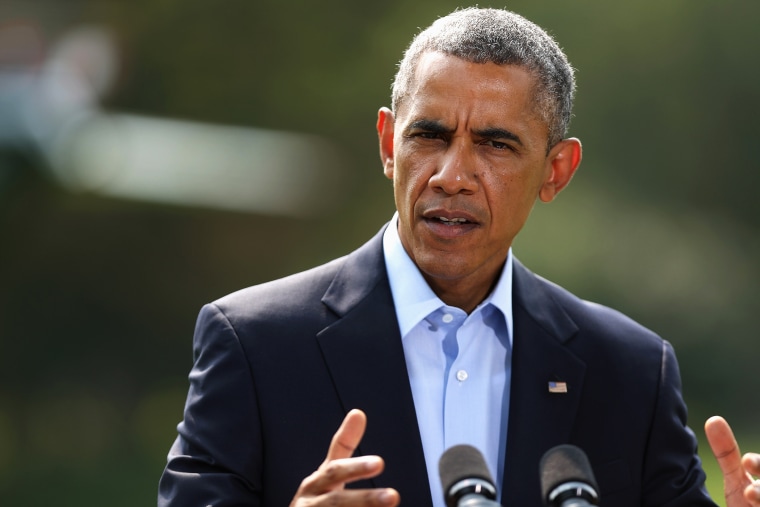President Obama announced on Saturday that the U.S. mission to combat Sunni extremists in Iraq could be a "long-term project" as Iraqis work to create a new, more inclusive government.
"I don't think we're going to solve this problem in weeks," Obama said from the White House lawn before departing for a two-week vacation in Martha's Vineyard with his family.
“Wherever and whenever US facilities are threatened, it’s my obligation as Commander-in-Chief to make sure they’re protected. We’re not moving our embassy any time soon, we’re not moving our consulate any time soon," the president said. "We’re going to maintain vigilance and make sure our people are safe.”
He also announced that he spoke to the leaders of the United Kingdom and France and that the two nations expressed strong support for the U.S. actions in Iraq and pledged to assist in the humanitarian effort to protect threatened religious minorities.
In recent weeks, tens of thousands of people in northern Iraq -- many of them Christians and Yazidis, an ancient religious sect -- have fled into the mountains to escape the advance of the Islamic State of Iraq and Syria (ISIS), a Sunni militant group seeking to create a new state in the region under Sharia law.
The U.S. launched multiple airstrikes against ISIS positions in northern Iraq on Friday, just hours after President Obama first announced he had authorized humanitarian airdrops and targeted strikes to protect Iraqi civilians and U.S. assets in the region. Those strikes continued Saturday with a series of successful aerial attacks to defend Yazidis who had come under ISIS fire near Mount Sinjar.
The immediate focus of the U.S. military operation in Iraq, President Obama said, was on preventing "an act of genocide" and to protect the Iraqi men, women and children trapped on the mountain by the extremists.
“We feel confident that we can prevent ISIL from going up the mountain and slaughtering people," Obama said, using an alternative name for the group. He added that the next step would be partnering with U.S. allies and the international community to find the refugees safe passage down from the mountain. "That may take some time,” he cautioned. “Moving them is not simple, in this security environment.”
The president emphasized repeatedly that in the longer term, fighting ISIS would require a unified and stable Iraq, and urged the Iraqi government to be more inclusive of both Sunnis and Kurds. He stressed that the U.S. would support the Iraqis in their military effort, but would not be doing it for them.
“Only Iraqis can ensure the stability and security of Iraq. The U.S. can’t do it for them, but we will support and be partners in that effort,” the president said.
“The nature of this problem is not one that a U.S military can solve. We can assist … but we can’t do it for them,” he later added.
While Obama admitted there would be no "particular timetable" for the U.S. military and humanitarian mission, he maintained that there would be no U.S. troops on the ground, saying: “I’ve been very clear that we’re not going to have US combat troops in Iraq again.”
Asked whether he planned to ask Congress for extra funding for operations in Iraq, the president said the U.S. already had significant assets in the region and was operating within its budget constraints. But, he added, “it’s possible” he may seek additional funding from Congress in the future as “there may be things that come up.”
